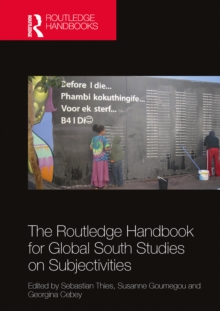
The Routledge Handbook for Global South Studies on Subjectivities PDF
Edited by Sebastian (Eberhard-Karls-Universitat Tubingen, Germany) Thies, Susanne Goumegou, Georgina Cebey
Part of the Transdisciplinary Souths series
Description
The Routledge Handbook for Global South Studies on Subjectivities provides a series of exemplary studies conjoining perspectives from Asian, African, and Latin American Studies on subjectivity in the Global South as a central category of social and cultural analysis.
The contestation of the Northern myth of the autonomous subject—the dispositive that contests subject formation in the South by describing it as fragmented, incomplete, delayed or simply deviant, has been a cornerstone of theory production from the South over the years. This volume’s contributions offer an interdisciplinary and transarea dialogue, reframing issues of selfhood and alterity, of personhood, of the human, of the commons and contesting the North’s presumption in determining what kind of subjectivities abide by its norms, whose voices are heard, who is recognised as a subject, and, by extension, whose lives matter.
In the context of the shifting dynamics of today’s manifold crises, they raise questions regarding how subjectivities act on or resist such forms of contestation, contingency, and indeterminacy. A major contribution to the growing body of scholarship on the Global South, this handbook will be an essential resource for students, scholars, researchers and instructors in literature, media and culture studies, sociology, anthropology, philosophy, law, politics, visual arts and art history.
Information
-
Download - Immediately Available
- Format:PDF
- Pages:382 pages, 11 Halftones, color; 11 Illustrations, color
- Publisher:Taylor & Francis Ebooks
- Publication Date:09/05/2024
- Category:
- ISBN:9781003860501
Information
-
Download - Immediately Available
- Format:PDF
- Pages:382 pages, 11 Halftones, color; 11 Illustrations, color
- Publisher:Taylor & Francis Ebooks
- Publication Date:09/05/2024
- Category:
- ISBN:9781003860501










